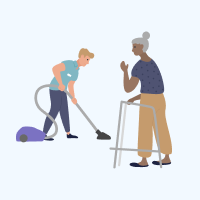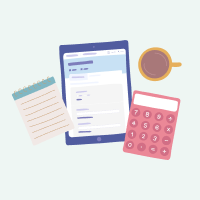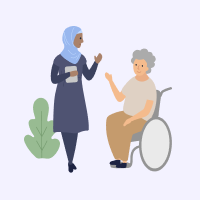Based on the information you give in your online application or during your call to My Aged Care, you may be referred for an assessment to better understand your support needs.
Assessments are done in person, at your own home. You don’t need to go anywhere. An assessment organisation will call you to confirm your needs based on information you have provided and arrange a time to complete your assessment.
How should I prepare for my assessment?
For an assessment, you should:
- have your Medicare card and one other form of ID proof - such as DVA card, driver's license, healthcare card, or passport
- have a copy of any referrals from your doctor
- consider if you would like a support person present
- have any information you already have about aged care services that you may want to discuss
- have contact details for your GP or other health professionals
- consider if you need special assistance to communicate, such as a translator or Auslan interpreter
- have information on any support you receive.
What will happen at the assessment?
Before starting, your assessor will ask if you agree to have the assessment. They may also ask for your permission to talk to people who support you, such as family, or your carer.
There may be a form to fill out
If you’re receiving a comprehensive assessment for some services such as care in an aged care home, care in your home, and flexible care, the assessor will ask you to complete an Application for Care Form.
Your assessor will talk to you about your needs
The assessor will have a copy of the information you provided to My Aged Care (either on the phone or in the online assessment application). This gives them an idea of what support you might need to help you return to or keep the level of independence needed to manage your day-to-day life. They’ll also ask about:
- what support you already have, and if it will continue
- your health, lifestyle and any health concerns
- how you’re going with completing daily tasks and activities around the home
- if you have problems with your memory
- any issues relating to home and personal safety
- family and community activities
- speaking to your GP or other health professionals.
Your assessor may give you information about service providers that can offer the care you need in your area. If you receive a home support assessment, your assessor may also provide you with referral codes for services. They may also talk to you about the possible costs of your services and where you can find more information.
Your assessor will work with you to develop your support plan
The support plan records what you discussed and agreed during your assessment such as:
- your strengths
- your difficulties
- your goals
- what you would like to achieve
- what preferences you have for your services
Your support plan sets out the care and services that will best help you. This support may be available from service providers, or it may already be available to access in your community. It may also be things that help you regain confidence and ability to resume daily activities.
Your assessor will give you a copy of your support plan
Your assessor will provide you with a copy of your support plan. This may be provided at the time of your assessment or by post or email. You can also view your support plan by logging into your My Aged Care Online Account.
Your assessor may ask if you want to have your support plan available on your My Health Record. This will make your support plan available to you and your doctors. If you don’t want this to happen, please tell your assessor. You can change your mind at any time by calling My Aged Care on 1800 200 422 and requesting for it to be shared or removed.
Questions to ask the assessor
You may also like to prepare any questions that you have, for example:
- What services are available to help me reach my goals?
- What services are available locally, and what are the waiting times?
- What supports are there for my carer?
- Are there service providers that speak my language or represent my religious or cultural beliefs?
- How can I contact the assessor if I have any questions after the assessment?
Can I have someone with me?
Yes. You never have to be alone in this process. If you choose, a family member, friend or carer can be with you during your assessment.
If you need a translator, your assessor can arrange one. Let them know that you need a translator when they call to book your assessment.
The Older Persons Advocacy Network can also help you and give you information about your rights. Advocates are available to all Australians seeking or receiving aged care services. This is a free service.
Call the National Aged Care Advocacy Line on 1800 700 600 (freecall) or visit the Older Persons Advocacy Network website.


